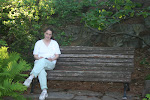I treked out to the garden last Wednesday morning. It was unseasonably cool, but I put on the one wool sweater I still hadn't packed away and boarded the metro to Pie IX. Despite the gray skies and cold, I wasn't alone in the garden. Photographers were out in droves .They were outfitted with expensive cameras, huge macro lenses and sturdy tripods and were painstakingly setting up their shots. Here's one of my own taken with my modest little digital. The dull, moody light definitely adds drama to the photo.
But then what do I know. I'm a poet not a photographer! (Although having at one time been married to an art photographer, I probably did learn a thing or two.)
*
My destination this morning was the lilac garden, but I found that it wasn't quite at its peak yet, so decided to walk over to the Lesley Hancock Garden instead. There wasn't much in bloom, except for one rhododendron bush, but it was definitely worth getting up for. It was completely covered with pink blossoms and more than lived up to its name: Aglow!
I thought I would take this opportunity to write a little about tanka, the five-line form of poetry that I have been including in my various entries. Tanka is much less known in North America than haiku, although it is the most ancient form of Japanese poetry. Tanka (originally called "waka") has been written in Japan for at least 1300 years, whereas haiku is a relative newscomer at only about 400 years old.
For much of its history, tanka was the poetry of the nobility and the ability to write these short lyric poems was as important as being able to wield a sword. Tanka was frequently used in furthering romantic liaisons between members of the aristocracy. Their poems with carefully chosen images and suggestive language were written on beautiful paper in exquisite calligraphy, the whole message being packaged up with a flower or a sweet smelling sprig of blossoms. Imagine if the success of your love affair depended on writing a winning poem.
among
the rhododendrons
remembering the way
he makes me feel
aglow
Although tanka has been used for centuries as the poetry of love in Japan, and now increasingly among contemporary English-language poets, its subject matter extends to every area of human feeling. In the words of Marianne Bluger, the Ottawa poet who died several years ago of cancer and who was the author of the first full-length Canadian book of tanka, "tanka is a quick check on the state of the heart." I find that writing tanka is a great way to discover what's on my mind.
do I want a young
and handsome man
or is it enough
to be
adored?




No comments:
Post a Comment